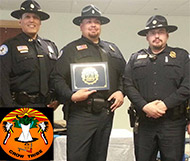1/7/2021
US Supreme Court Takes Up Tribal Traffic StopsHigh court justices to limit or expand the authority of Indian tribes to conduct speed traps and traffic stops.

The power of Indian tribes to exercise authority over non-Indian drivers on public roads will be decided this year by the US Supreme Court. Justices agreed to take up the case of Joshua James Cooley, who encountered a Crow Indian Reservation police officer while he was resting in his truck on the side of US Route 212 in Montana.
Tribal Officer James Saylor pulled up and ordered Cooley to lower his window. The officer could see Cooley was not an Indian and that he had bloodshot eyes -- Cooley explained this by saying he had pulled over because he was tired. The officer did not believe Cooley's story that he was out late at night buying a truck, so he ordered Cooley to lower the window further to give him a better look inside the vehicle. He saw two rifles. A thorough search of the truck uncovered a plastic bag containing methamphetamine.
At trial, a federal court found the tribal officer's actions were unreasonable and that he lacked the authority to detain a non-Indian on a public highway, except to turn him over to "state or federal authorities" in the case of an obvious violation of state or federal laws. The Ninth Circuit US Court of Appeals upheld the ruling. Indian tribes are asking the high court to overturn the decision so that they might have unfettered discretion to stop and fine anyone on a road touching tribal lands.
"Among the promises made by the United States to the Crow Tribe, the very first -- Article I of the 1868 Treaty -- was the ability to ensure the apprehension and prosecution of 'bad men,' including their exclusion from the reservation, 'upon proof,'" lawyers for the National Congress of American Indians wrote. "This court should hold the government to its word."
Cooley, who is represented by a public defender, offered a much more modest defense for his position. His counsel insisted the tribes misunderstand the limits of their law enforcement power.
"This lack of criminal jurisdiction is rooted in the diminished sovereignty that necessarily results from Indian tribes' dependence on the government of the United States," federal defender John Rhodes and lawyer Eric R. Henkel wrote. "Indian tribes lack criminal jurisdiction over non-Indians because the United States has manifested a solicitude that its citizens be protected by the United States from unwarranted intrusions on their personal liberty."


